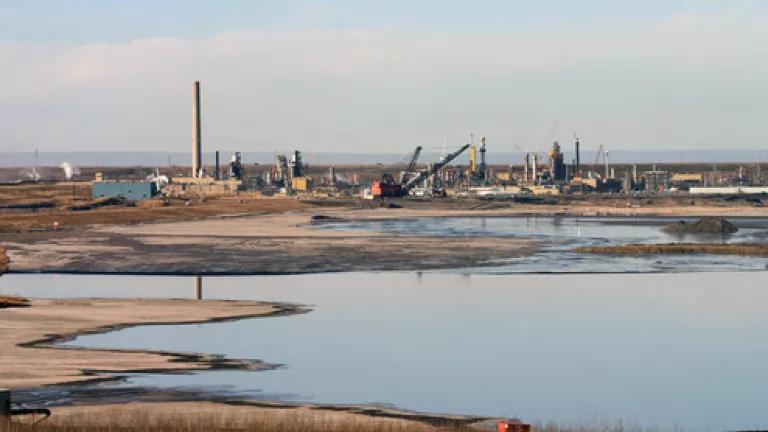
From a birds eye view, the Syncrude tar sands mining waste ponds stretch out glistening attractively in the sun. On a long migration north to nest, I can see how 500 ducks would decide to land on one of those vast stretches of water. The ducks wouldn't realize they'd be landing in waters with so much oil that they would be unable to fly again. The cannons meant to keep them away were not turned on and the scarecrows placed over the surface of the water weren't much of a deterrent. Last April, those 500 ducks all died. Yesterday, Alberta and Canada brought charges against Syncrude under provincial environmental law and under the federal migratory bird law.
Canada's Boreal forest is prime nesting grounds for waterfowl and songbirds from throughout the Americas. As shown in our report on the impact of tar sands on migratory birds, tailings ponds may cause the deaths of 8,000 to 100,000 birds every years most of which go unreported. The death of 500 ducks captured the imagination of people around the world. Of course, the ducks are a warning - the canary in the tar sands mine - one in a growing number of warnings that include concerns about local cancer rates, leaking waste ponds, and increasing global warming pollution.
The governments of Alberta and Canada have not been very quick to enforce environmental laws against tar sands companies. This is the first case of its kind that I know of - charging a tar sands company with not meeting its obligation to protect migratory birds. And yet, if the Canadian migratory bird law was truly enforced, the tar sands mining waste ponds could not exist. The law is very clear and says that you may not "deposit a substance that is harmful to migratory birds, or permit such a substance to be deposited, in waters or an area frequented by migratory birds or in a place from which the substance may enter such waters or such an area." A one time fine of up to $800,000 is unlikely to have much impact on a tar sands oil company. What we need is a decision to clean up the existing waste ponds and to prohibit the creation of any new ones.
Alberta and Canada may hold up these charges as an example of how they are enforcing environmental laws in the tar sands. Yet, it took workers at Syncrude blowing the whistle on the company for us to even know about the oiling of the ducks. It took a private prosecution by EcoJustice, Sierra Club and ForestEthics to start the enforcement case rolling.
Next week President Obama will visit Canada on exactly the same day the private prosecution of this case was due to go to court. Both Alberta Premier Stelmach and Canadian Prime Minister Harper have indicated that they want to protect tar sands from global warming regulation. Alberta and Canada have likely taken this case over from a private prosecution in part to send a message that they are doing something about the many environmental problems in the tar sands. But one prosecution in the midst of so many problems is not enough to make the tar sands look green.
President Obama has been talking about a new way forward for a green energy economy. Tar sands oil extraction does not fit in a green economy. Dead ducks do not fit in a green economy. But Alberta has lots of potential to be a major player with wind energy and across North America we need to be working together to develop environmentally friendly energy and transportation options.
